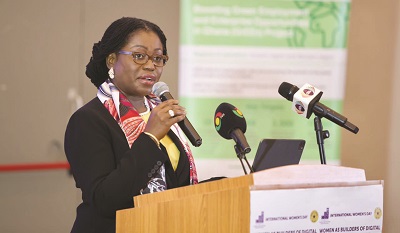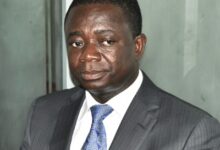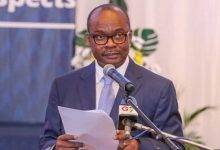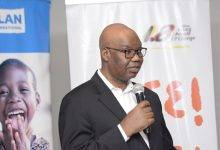
The Second Deputy Governor of the Bank of Ghana (BoG), Mrs Elsie Awadzie Addo, says digital technology presents opportunity to empower women economically and increase their participation in the economy.
“There are, in my view, more opportunities today than ever before to strive towards more gender equality. Technology and digitisation hold great promise especially for the developing world to leapfrog economic, political, and social advancement of women by levelling the playing field in a cost-effective way and help to achieve in particular, Sustainable Development Goals -5 on “Gender equality and women’s empowerment,” she said at a ceremony to mark the International Women’s Day (IWD).
Organised by the United Nations Capital Development Fund (UNCDF) as part of the International Women’s Day observed on Tuesday on the global theme “Break the Bias”,” it was on the sub-theme “Women as Builders of Digital Economy in Ghana.”
MrsAddo who delivered the keynote address said the digital economy provided immense opportunities for women to advance themselves through online education and skills acquisition, increased trading in goods and services with more digital payment options, digital savings, credit, insurance, and investment opportunities, all leveraging widely available technology.
The Second Deputy Governor, said the World Economic Forum’s 2018 report titled “Our Shared Digital Future: Building an Inclusive Trustworthy and Sustainable Digital Society” highlighted the benefits of the digital economy to promote economic and financial inclusion and supports the view that the digital revolution had the power to reduce inequalities across the world.
“It is widely acknowledged that digital financial services (DFS) have the potential to make a significant difference in bridging the gender gap in access to finance which has remained at nine percent in the developing world since 2011. DFS can help bridge the gap in account ownership, increase women’s participation in the financial system and give them the opportunity to save formally or access credit,” MrsAddo said.
She said DFS could help women’s businesses by lowering costs and giving access to a diversity of financial services.
“McKinsey estimates that DFS could turn 1.6 billion of the two billion unbanked people into formal financial services customers by 2025, thus adding US$3.7 trillion to the GDP of emerging economies. Indeed, the World Bank’s Global Findex database, for the first time in 2017, reported the significant opportunities for leveraging digital technologies to increase access to and use of digital financial services by the unbanked, particularly women.
Mrs Addo said women had been the backbone of Ghana’s economy and have from time immemorial contributed significantly to our socio-economic growth and development, stressing that the World Bank estimated that 44 per cent of micro, small, and medium enterprises (MSMEs) in Ghana are female-owned, and the sector accounted for about 92 percent of all businesses and contributes about 70 per cent of Ghana’s Gross Domestic Product.
The United Nations Resident Co-ordinator, Charles Abani, said the United Nations Development Programme was developing a new development framework with Ghana and women economic empowerment and inclusion would feature greatly in it.
She said women had been left behind in the digital transformation drive and needed to be brought on board.
The Country Lead of the UNCDF, EneaStocco, the BoG and the UNCDF launched the international advocacy campaign “Reaching Financial Equality.”
She said women’s economic empowerment and closing gender gaps were central factors for the country to promote an inclusive economic growth and to achieve the 2030 agenda for the SDGs.
BY KINGSLEY ASARE






